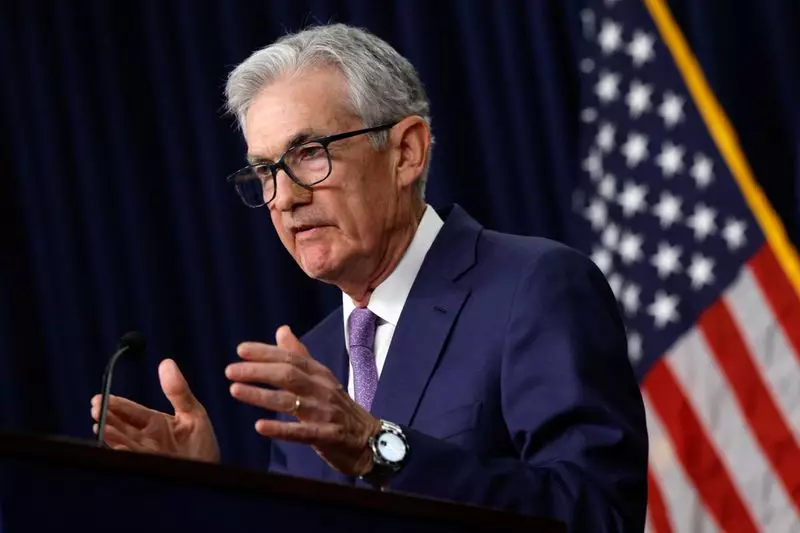As Jerome Powell approaches 2025, he finds himself in a challenging situation as the Chair of the Federal Reserve. The task at hand involves steering monetary policy with a keen awareness of political pressures, particularly those from former President Donald Trump and his impending administration’s economic strategies. This intricate balancing act embodies the struggle to maintain the Federal Reserve’s independence while concurrently addressing the complexities posed by potential inflationary policies that a new administration may introduce.
Powell’s leadership is under scrutiny as the Fed tries to adjust its approach without overtly indicating how incoming policies might affect interest rates. Following Trump’s election victory in November, Powell explicitly stated that the Fed does not engage in speculation, refraining from making assumptions about future policy impacts. “We don’t guess, we don’t speculate, and we don’t assume,” he firmly asserted. Despite this strong stance, recent Fed projections appear to show an inconsistency with these claims, as expectations of fewer rate cuts in 2025 begin to surface, almost as if anticipating the fallout from Trump’s policy proposals.
Just last week, the Fed enacted a quarter-point rate cut, completing a full one percentage point reduction since September. Nevertheless, this reduction has been met with a reassessment, showing that officials now expect to issue only two cuts in 2025, a significant drop from earlier forecasts of four. This adjustment indicates a more cautious outlook primarily driven by heightened inflation expectations, projected at 2.5% for 2025, up from the previously estimated 2.2%. Alarmingly, a notable majority of Fed officials – 15 out of 19 – recognize the risk that inflation could exceed these projections, illuminating the committee’s delicate balancing act between fostering economic growth and curbing inflationary tendencies.
The uncertain economic climate has prompted scrutiny of Powell’s anti-political posturing. In private discussions, it has been suggested that he counseled colleagues to avoid language that could be perceived as politically motivated. While Powell aims to uphold the Fed’s image as a nonpartisan institution governed by data-driven policies, the emerging economic policies under Trump’s administration may complicate this narrative. Powell is acutely aware of the tumultuous period during Trump’s first term, characterized by trade wars that precipitated a series of rate cuts. The current economic environment, marred by persistent inflation, stands in stark contrast to the relatively stable conditions of 2018.
At a recent press briefing, Powell elaborated on this contrasting scenario, indicating that the Fed is now actively revisiting pathways to comprehend how proposed tariffs and regulatory measures could impact inflation and economic growth. His remarks reflect a commitment to preparedness, wherein the Fed seeks to align its policies with the actual policies that come to fruition in the upcoming administration.
While Powell and his colleagues grapple with these challenges, Trump’s economic advisors are promoting a counter-narrative. They argue that deregulation and an increase in energy production could potentially offset inflationary pressures. Treasury Secretary-designate Scott Bessent notably asserted that tariffs would not automatically lead to inflation, suggesting that any rise in costs for one product merely translates to a decrease in consumer spending power in other areas. Critics of this stance, however, contend that it oversimplifies the complex dynamics of the economy and fails to anticipate wide-ranging consequences of shifting consumer prices.
Field experts, including economists from prominent financial institutions, emphasize that the Fed’s cautious approach is dictated by the broader economic landscape rather than the hope that deregulation will safeguard against inflation. As Michael Feroli, JP Morgan’s chief economist, articulated, the current environment differs significantly compared to previous years of low inflation. The ongoing recovery, characterized by close to full employment, suggests a higher likelihood that businesses will pass increased costs onto consumers, thereby complicating the inflation narrative.
The future trajectory of the economy remains unpredictable, with discussions about the impact of tariffs and government policies continuing to stir debate among analysts. Economists such as Ray Farris highlight the uncertainty surrounding the speed at which companies might adjust their prices; gradual adjustments could create the illusion of persistent inflation, even if supply-side improvements occur. As Powell and his colleagues look ahead, they face the daunting task of discerning the genuine economic signals from the noise of political rhetoric, all while striving to uphold the Federal Reserve’s reputation as an independent entity steadfast in its mission to foster economic stability.
Navigating the next few years would require not only astute economic strategies but also an unwavering commitment to the Fed’s foundational principles in the face of intensifying political developments. As Powell faces these trials and tribulations, he must remain vigilant, ensuring that monetary policy is responsive to real economic needs while keeping the Fed’s integrity intact amid potential partisan pressures.

